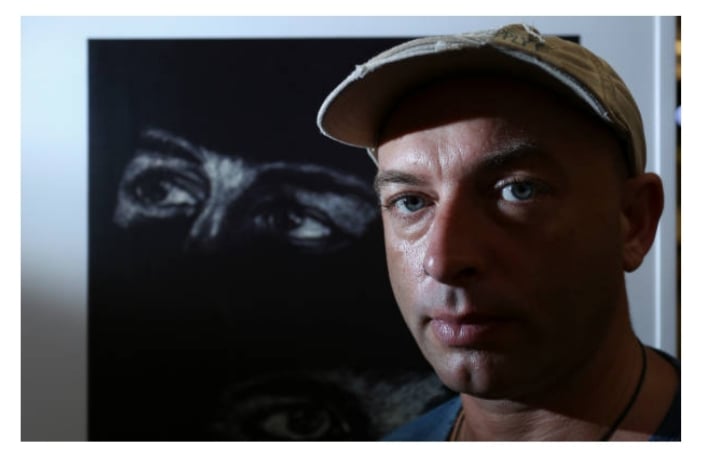
During his waking hours, artist Lee Hadwin has no real creative talent—and he’d be the first one to admit this. At night, though, when he’s deep asleep, he makes elaborate drawings and paintings. And he doesn’t remember any of it.
It started, Hadwin explains, when he was four years old. A frequent sleepwalker, he would get up from bed and roam the house. Eventually, he started pulling crayons and pencils out of his school bag and scribbling on his bedroom walls. After he was done, he’d go back to sleep.
His parents were confused. “He’s just a child sleepwalking,” the doctor told them. “He’ll grow out of it.”
But he didn’t. In fact, he got better at his craft. Over the course of one night when he was 15, Hadwin made three small pencil drawings of Marilyn Monroe. They weren’t perfect, but they looked like drawings done by someone who’d likely had some training, was probably older than 15, and was certainly awake at the time.
“I suppose for me, that’s when it all changed,” Hadwin tells artnet News. “Suddenly it was like, ‘Whoa, I may have something here.’”
Lee Hadwin, 55.8580. Courtesy of the artist.
Since then, Hadwin, who was born in Australia and now lives in London, has made hundreds of nighttime works. Sometimes they’re figurative sketches; other times they’re more abstract. The schedule is similarly unpredictable. Usually, he’ll make a piece a couple of nights a week, though occasionally he’ll be limited to one every couple of months. In his early 20s, he went years without making anything.
Hadwin has learned to prepare for the occasions when inspiration finds him by sleeping with art materials nearby. He prefers what comes from moments of spontaneity and his subject matter doesn’t have a clear provenance. (His drawings of Marilyn Monroe did not arrive after he, say, fell asleep watching Gentlemen Prefer Blondes.) Rather, they come to him the way dreams to all of us—some inexplicable mix of lived experience and imagination.
A spiritual man, Hadwin is also not ruling out the possibility of other forces being at play. He recalls one instance when, the night prior to a meeting with a group of sleep experts, he drew the number 23. “One of the first questions they asked was, ‘What’s the last drawing you made?’” Hadwin recalls. “I said, this is what I drew last night’ and I handed the picture to the doctor. Then I saw that she had a necklace with the number 23 on it. ‘It’s my lucky number,’ she said.’”
Lee Hadwin, 25.7617. Courtesy of the artist.
“I had never wanted to be an artist,” Hadwin says. “I was never in to art, in to school. My highest grade was a D.” He says he’s only started calling himself an artist in the past four years, when he quit his day jobs and started making a living solely off of his art. (His works generally sell for between $1,500 and $10,000.)
Today his work is included in a current exhibition of sleep-related art in Albury, Australia. He’s also working on a book about his art, life, and inspirations titled The Awakening, due out next year.
He knows that some more professionally trained artists and curators might not take him seriously, but says, “I never take it personally. At the end of the day, art is subjective. It doesn’t matter if you’ve studied art for one year or 40—if someone likes a piece, that’s all that matters.”
Lee Hadwin, 54.9967. Courtesy of the artist.
For those who might question the truth of Hadwin’s story, it’s worth noting that he has been filmed making art in his sleep numerous times and has undergone several sleep studies. Each time the researchers have chalked the habit up to a form of sleepwalking. Hadwin points out that there are plenty of people around the world who do curious things while asleep—eat or write poetry, for example.
He has an idea for a reality show where a group of these people are filmed living together in a house, Big Brother-style.
“With a load of sleepwalkers, I think it would be a great experiment!” he says, sincerely.